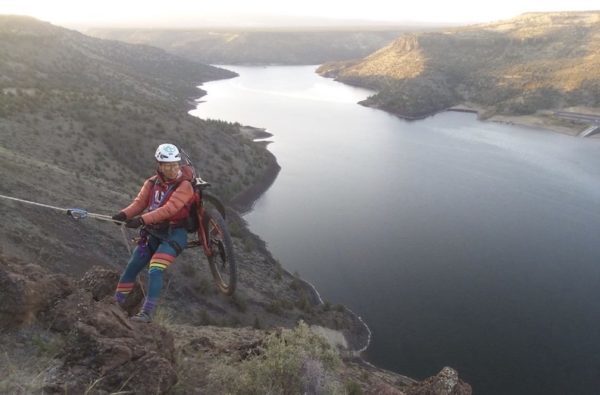

When designing this year’s Expedition Oregon event — a five-day team adventure race covering roughly 300 miles of unmarked terrain — Race Director Jason Magness of Bend Racing knew only a handful of teams would finish the full course.
Dubbed “America’s Toughest Race,” 36 teams of four competed in the third annual Expedition Oregon, held May 12-16 near Prineville and in the Ochoco Mountains. Part of the Adventure Racing World Series, the non-stop, seven-stage race was composed of several disciplines: trekking/running, mountain biking, rock climbing, whitewater packrafting and navigation.
 This year’s highly technical course included rafting a 60-mile whitewater section with Class III rapids and rappelling a vertical cliff with a mountain bike strapped to one’s back. “The race required real expertise and skill,” said Magness.
This year’s highly technical course included rafting a 60-mile whitewater section with Class III rapids and rappelling a vertical cliff with a mountain bike strapped to one’s back. “The race required real expertise and skill,” said Magness.
In the end, five teams — two local to Central Oregon — finished the complete course by hitting all designated checkpoints. Magness’ wife, Chelsey, was part of the second-place team, Journey/Bend Racing. All other teams missed checkpoints or cut the route short, but were still able to place overall.
Veteran and beginner teams face many of the same struggles in competition; adventure racing is as mentally challenging as it is physically. In addition to the unknowns that come with navigating rough terrain with only a map and compass (Magness likens races to Choose Your Own Adventure books), multi-day racing leaves little time for rest.
Sleep deprivation can lead to brain and motor impairment, or “brain fog,” according to Magness. “Our sport celebrates tenacity and overcoming adversity,” he said of the grueling nature of adventure racing. “In competition, there’s always the question in your mind of, ‘will I get beaten by this course?’”
For many adventure racers, not completing a full course is seen as motivation — not defeat. “It makes racers want to come back and finish stronger next time,” he added.
Magness knows firsthand what it takes to compete in adventure racing at an elite level. In 2018, he and Chelsey were part of the winning team (Bend Racing, formerly known as YogaSlackers) of the Patagonian Expedition Race in Chile — a 600-kilometer race that is often considered the hardest in the world.
After undergoing hip resurfacing surgery to replace a damaged hip joint this past February, Magness is working with Rebound physical therapist Pablo Gomez (Rebound @ BOSS Sports Performance) to regain the hip strength and function needed for competition.
He plans to return to racing next month, when he is set to compete with a partner in a 360-mile paddle race (WA360) via kayak in Washington’s Puget Sound. And he is back to (modified) training with his Bend Racing teammates.
“As an elite athlete, getting injured in the middle of your career is pretty devastating,” said Magness, who had his other hip surgically repaired in 2016. “So to receive care at a place like Rebound that understands athletes and is supportive of the healing process is really powerful.”
